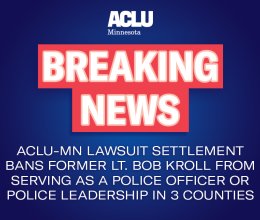
Last week, the Minneapolis Police Department announced an overhaul of its body camera policy, claiming that it will now have “teeth.” The actual policy, however, is a mixed bag — with neither MPD Police Chief Medaria Arradondo nor Mayor Jacob Frey publicly acknowledging the rollbacks they are making to the previous policy changes last summer.
The issue of police body cameras is a tough one. When the city mandated camera use, the ACLU of Minnesota worked to promote police accountability and minimize the potential privacy violations the cameras pose. But we have yet to see body cameras used effectively to help address police misconduct. Instead, we have found ourselves tied up in legislative battles trying to prevent laws that would keep footage from body cameras secret, even when there is a strong public interest in the video.
The problem hasn’t solely been in the policy — it’s been the unwillingness of the MPD to hold their officers accountable. Deputy Chief Henry Halvorson admitted in February that the department was not tracking compliance, claiming that it was too labor intensive. And not a single officer has yet been disciplined for noncompliance.
The ACLU-MN was encouraged last summer when then-Interim Police Chief Arradondo announced changes to the body camera policy. Chief Arradondo announced police officers would be required to activate their body cameras at dispatch — a behavior that could hopefully become routine for officers and contribute to greater compliance. Chief Arradondo also announced that noncompliance in body camera activation would result in a minimum level of discipline, consisting of either a written reprimand or a documented oral reprimand as well as up to 40 hours’ suspension in certain circumstances.
Now we are seeing those advancements rolled back, leaving us to question whether there is will to hold officers accountable to a set policy.
In part due to concerns about data storage, officers will now be required to activate body cameras two blocks away from their destination rather than the clear directive to activate immediately on dispatch. There will always be trade-offs when implementing technology. The priority, however, should be on policies that maximize compliance.
We are also very concerned that only now is Chief Arradondo implementing tiered discipline levels for various infractions. Failure to active body cameras in situations involving reportable use of force, injuries, or significant property damage now will result in a minimum 40-hour suspension. For any other situation, however, the minimum suspension discipline was reduced to nondisciplinary actions, such as coaching, to help correct the behavior.
It’s puzzling that the city now says the new policy is intended to “maximize the number of times [the body camera] is supposed to be turned on.” The previous policy did require body cameras to be turned on every time at dispatch. Indeed, we learned last week from Chief Arradondo that body camera usage increased substantially after he directed officers to activate their cameras upon dispatch. And there was a policy to discipline officers who didn’t comply.
One positive change that the MPD is making is tasking additional staff with compliance monitoring. That's a start, and we have no doubt that when the MPD decides to implement and enforce best practices for body cameras, the policy will, in fact, have “teeth.” But a policy is merely a tool — and the MPD has to use it if it is ever going to work.


